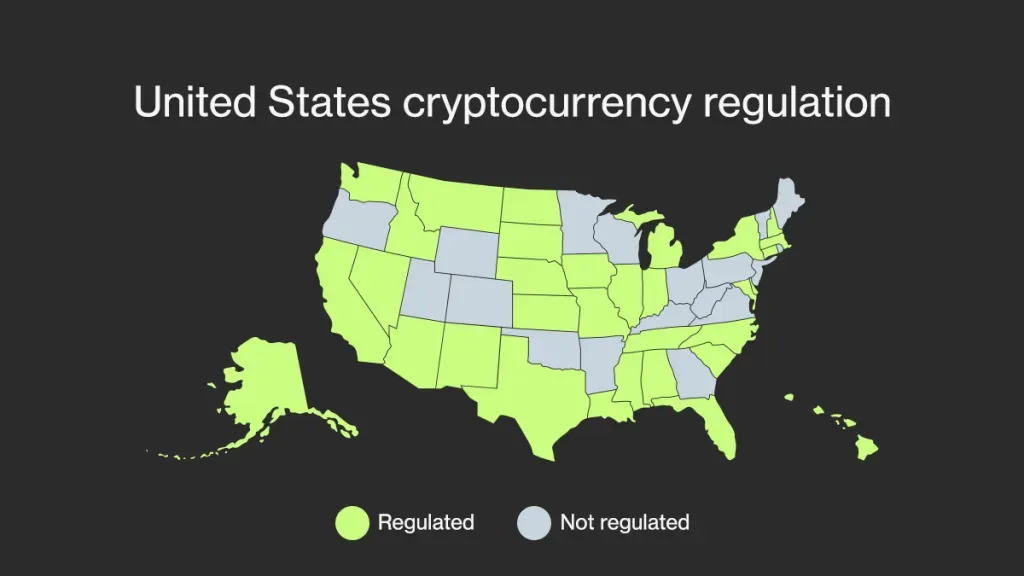In recent months, the landscape of crypto legislation has shifted dramatically, sparking heated debates in Washington. With former President Donald Trump advocating for a timely passage of a stablecoin bill, the stage seemed set for significant legislative progress in the cryptocurrency sector. However, this momentum faltered as key Democrats, previously supportive of initiatives like the GENIUS Act, now oppose measures that could be seen as benefiting Trump’s financial interests. Concerns have arisen about the implications of cryptocurrency on national security, prompting lawmakers to demand stringent regulations. As the Senate gears up for a crucial vote, the unfolding drama highlights the complexities and challenges facing crypto legislation in the current political climate.
The ongoing discussions surrounding the future of digital currencies have intensified, prompting lawmakers to weigh in on cryptocurrency regulations. Alternative terms such as digital assets and virtual currencies are frequently referenced in legislative meetings, with particular emphasis on upcoming proposals like the GENIUS Act and related measures. As discussions unfold, the divide between party lines is stark; with strong opposition from certain factions, particularly among Democrats, signaling a notable shift in support. National security has emerged as a pivotal issue, with many legislators advocating for additional safeguards to prevent misuse and exploitation of the crypto market. The rapid evolution of this digital finance landscape demands careful consideration and a cohesive legislative framework, underscoring the urgent need for clear crypto regulations.
The Fallout of Crypto Legislation in Congress
The political landscape surrounding crypto legislation has shifted dramatically, particularly with the involvement of major party figures. Just months ago, President Trump was a driving force behind the proposed stablecoin bill, urging Congress to expedite its passage. This was viewed as a strategic move to solidify his influence over the burgeoning crypto market, which his administration was poised to regulate favorably. However, a revolt within the Democratic party, instigated by concerns over Trump’s personal financial interests in crypto, has thrown a wrench into these plans. Legislators who once appeared supportive now face internal pressure to reconsider their positions, complicating the legislative process.
Democrats, particularly led by figures like Rep. Maxine Waters, have voiced concerns that any crypto legislation—even that which seems innocuous like the GENIUS Act—could inadvertently empower Trump financially. This evolving narrative places pressure on lawmakers to balance support for technological innovation in finance with ethical governance standards. The friction suggests that the once-unified approach to crypto regulation is now mired in political conflict, undermining the progress anticipated just a few months prior.
Stablecoin Bills Under Scrutiny: National Security Challenges
As discussions around the GENIUS Act unfold, the urgency for comprehensive national security provisions has emerged as a pivotal aspect of the debate. Prominent Senators, including Elizabeth Warren, are spearheading calls for stringent amendments that ensure stablecoin legislation does not inadvertently facilitate illegal activities or pose risks to national security. The memo circulated among Democratic members of the Senate Banking Committee stresses the need for robust anti-money laundering frameworks that would hold digital currency exchanges accountable—important measures considering the potential for cryptocurrencies to be exploited by malign actors.
A notable case highlighting these concerns was the $1.5 billion stolen by North Korean hackers from the crypto exchange Bybit, illustrating the vulnerabilities within current systems. As lawmakers consider the ramifications of the GENIUS Act, some view the proposed safeguards as essential steps to prevent cryptocurrencies from being used for illicit purposes. A well-defined regulatory landscape is crucial not only to protect consumers but also to maintain the integrity of the U.S. financial system—an aim shared across party lines, albeit with diverging strategies.
Democratic Dissent: Analyzing Resistance to Crypto Policies
The changing stance of influential Democrats regarding crypto legislation, particularly under the reign of a pro-crypto presidency, has created unexpected divisions within the party. Initially perceived as a bipartisan effort, support for crypto regulation has revealed significant ideological rifts; this is exemplified by Waters’ recent opposition to any legislation allowing Trump to profit from stablecoins. Such dissent among Democrats underscores a broader concern about the ethical implications of crypto ownership and its potential corruption due to conflicts of interest. The fallout from this upheaval raises critical questions about how far representatives are willing to go to uphold ethical standards against political expediency.
Furthermore, with Democrats withdrawing their support from the GENIUS Act, it signals a new era of cautious legislative engagement with the crypto sector. Lawmakers are now tasked with ensuring that any favorable legislation does not inadvertently allow members of Congress to profit from the very markets they are meant to regulate. The discussion reflects a complex interplay between innovation and oversight, as party members align their priorities with the broader interests of national integrity and public trust.
The Future of Stablecoins: Economic Implications
As the debate on the GENIUS Act progresses, the economic implications of stablecoins remain at the forefront of consideration for lawmakers. Stablecoins, digital currencies pegged to traditional fiat currencies, hold unique potential to enhance the stability and liquidity of the financial ecosystem. With proponents arguing that these digital assets could drive advancements in technology and finance, the challenge lies in crafting legislation that fosters innovation without sacrificing regulatory oversight. The ramifications of failing to provide a clear regulatory framework could hinder America’s competitiveness in the global financial market, particularly as global interest in cryptocurrencies rises.
However, the recent backlash from key Democratic leaders challenges the narrative of unbounded optimism for crypto. Stricter measures regarding stablecoins, especially those tied to the financial interests of political figures, may act as a barrier to rapid progress unless adequately addressed. As the public and private sectors navigate this complex terrain, finding common ground on the economic advantages of stablecoins while ensuring proper regulatory mechanisms are in place will be crucial to fostering a sustainable future for cryptocurrencies in the U.S. economy.
Impacts of the Trump Administration on Crypto Legislation
The influence of the Trump administration on crypto legislation has been profound, encompassing both support for the industry and instances of significant contention. Trump’s approach to cryptocurrency has often inspired a wave of political and regulatory support, from advocating for stablecoin legislation to engaging with industry stakeholders. However, as his personal investments and affiliations with crypto firms surface, opposition has materialized among Democrats who fear potential conflicts of interest. The juxtaposition of legitimizing a burgeoning market while grappling with ethical governance challenges has become a defining feature of this administration’s legacy.
Moreover, the complexities surrounding Trump’s investments in crypto raise fundamental questions regarding accountability. Lawmakers are increasingly aware that as crypto markets evolve, so too must the principles governing them. The emerging consensus among some lawmakers emphasizes that strong oversight is necessary to avert potential misuse of legislative strength for personal gain. The evolving narrative of Trump’s crypto engagement thus highlights the necessity for comprehensive reforms, ensuring that policy developments prioritize public interest over individual financial ambitions.
Navigating the Political Landscape of Crypto
As negotiations surrounding crypto legislation unfold in the current political climate, navigating the diverse interests of lawmakers proves to be a challenging endeavor. With factions within both major parties presenting unique concerns and support bases, any attempt to reach consensus will require deep understanding and willingness to compromise. Democrats, particularly those who initially supported the GENIUS Act, now find themselves wrestling with ethical, legal, and national security concerns that complicate their positions. The ramifications of this contentious landscape reflect broader issues of governance and accountability in modern politics.
Furthermore, the hurdles faced by crypto legislation highlight the need for rigorous dialogue among lawmakers. Proponents of regulation must engage with dissenting voices to address concerns such as potential conflicts of interest and overarching impacts on national security. Achieving bipartisan support for crypto initiatives is essential for stabilizing a rapidly shifting industry while ensuring consumer protection. As Congress grapples with these nuanced discussions, the outcomes will significantly shape the trajectory of cryptocurrency regulation in the United States.
Concerns Over National Security and Crypto Regulation
The intersection of national security and crypto regulation has taken center stage as policymakers examine the implications of quickly evolving financial technologies. Specifically, the ability of cryptocurrencies to facilitate anonymity raises significant questions about their use in illicit activities, which has become a pivotal concern for Senators like Elizabeth Warren. The urgency to address these issues is amplified by high-profile security breaches linked to cryptocurrencies, emphasizing the need for robust regulatory frameworks that mitigate risks without stifling innovation.
Multifaceted strategies are emerging in response to these concerns, as lawmakers push for amendments that encompass rigorous oversight of stablecoin operations and enhanced tracking of financial transactions. With national security on the line, the stakes are high for ensuring that stablecoins do not become tools exploited by criminals or foreign adversaries. Crafting legislation that carefully balances security measures with the need for economic flexibility will likely remain a top priority for Congress in shaping the future landscape of cryptocurrency in the U.S.
Ethical Considerations in Cryptocurrency Legislation
As the discourse surrounding crypto legislation intensifies, ethical considerations have begun to play a crucial role in shaping the debate. The emergence of conflicts of interest, especially in cases where politicians hold financial stakes in cryptocurrencies, poses serious questions about integrity in governance. Lawmakers like Maxine Waters have taken a stand against any enabling legislation that could benefit influential politicians financially, reflecting a growing alertness to the ethical ramifications of crypto investment among public officials. This awareness is vital for maintaining public trust in governmental institutions and ensuring that regulations serve the common good.
Moreover, as the landscape of currency shifts towards cryptocurrency, the importance of transparency in legislative processes cannot be overstated. Ensuring that discussions around significant bills like the GENIUS Act remain public and accountable can help mitigate perceptions of corruption and self-dealing. In this regard, bipartisan efforts to promote ethics in crypto legislation must strive to create frameworks that not only harness the potential of digital assets but also foster a culture of accountability in the rapidly evolving world of finance.
The Role of Bipartisanship in Crypto Regulation
In the wake of increasing tensions surrounding crypto legislation, the role of bipartisanship has never been more crucial. Lawmakers from both parties are recognizing that a united front can lead to effective regulatory frameworks that enhance market stability while protecting consumers. While various tensions have surfaced regarding the motivations behind certain legislative actions, successful cooperation will require compromise and a shared vision for the future of digital currencies in America. The potential for bipartisan support underscores the recognition that regardless of political affiliations, there is a common interest in fostering innovation alongside responsible governance.
However, as demonstrated by the evolving positions of party members on the GENIUS Act, sustaining bipartisan support poses its challenges. Differing priorities and foundational beliefs about cryptocurrencies can create hurdles for constructing a singular cohesive strategy. Therefore, lawmakers must engage in meaningful dialogue and negotiation, striving to build consensus that transcends partisan barriers while carefully considering critical concerns such as national security and ethical governance. Only through collaborative efforts can Congress effectively shape a regulatory environment that supports the crypto industry while safeguarding American interests.
Frequently Asked Questions
What is the current status of the stablecoin bill GENIUS Act amidst opposition from Democrats?
The GENIUS Act, a stablecoin bill, faces significant opposition from a group of nine Democrats who demand major changes before they will support it. This opposition highlights concerns regarding the implications of the bill on national security and consumer protection.
Why are Democrats opposed to crypto legislation such as the GENIUS Act?
Democrats are raising concerns about the GENIUS Act due to potential national security risks and fears of enabling financial corruption, especially in light of Trump’s investments in crypto. They are pushing for stricter regulations to prevent abuse by terrorists and criminals.
How does Trump’s involvement in crypto impact the legislation surrounding stablecoins?
Trump’s investments in crypto, particularly through his firm World Liberty Financial, have led to increased scrutiny and opposition from Democrats, who worry that stablecoin legislation could benefit Trump financially while raising ethical concerns about self-dealing.
What national security concerns are associated with current crypto legislation?
National security concerns relate to the potential for stablecoins to be exploited by malicious actors, including terrorists and foreign adversaries. Proponents of regulation, like Sen. Elizabeth Warren, argue that legislation must include provisions to address these vulnerabilities.
What changes do Democrats want to see in the stablecoin bills to ensure national security?
Democrats are advocating for amendments to the GENIUS Act that would impose stricter anti-money laundering (AML) requirements and extend U.S. sanctions to cover stablecoin transactions, thereby preventing illicit activities.
How has the political climate affected the passage of crypto legislation like the GENIUS Act?
The political climate has shifted, with increasing opposition from Democrats who previously supported crypto legislation. This shift is largely driven by concerns over Trump’s potential conflicts of interest and the need for enhanced consumer protections in the crypto space.
What are stablecoins and why are they significant in crypto legislation?
Stablecoins are cryptocurrencies designed to maintain a stable value, typically pegged to a fiat currency like the U.S. dollar. Their significance lies in their potential to facilitate transactions while minimizing volatility, which has made stablecoin bills like the GENIUS Act a focal point in ongoing crypto regulation discussions.
What impact could the GENIUS Act have on the future of the crypto market in the U.S.?
If passed, the GENIUS Act could set a critical framework for the regulation of stablecoins in the U.S., potentially shaping the future of the crypto market by providing clarity and promoting consumer protection while addressing national security concerns.
| Key Point | Details |
|---|---|
| Initial Support for Crypto Legislation | Strong backing from President Trump, bipartisan support among lawmakers, and regulatory encouragement for the crypto industry. |
| Democratic Revolt | Maxine Waters and nine other Democrats oppose the stablecoin bill (GENIUS Act) over concerns of oversight conflicts involving Trump’s investments. |
| National Security Concerns | Senator Elizabeth Warren highlights risks of utilizing stablecoins for illicit activities, urging amendments to strengthen anti-money laundering and security provisions. |
| Potential Changes to the GENIUS Act | Negotiations ongoing to address Democrats’ concerns, including amendments for consumer protection and national security. |
| Industry Reaction | Industry advocates emphasize the necessity of legislation for stability and security in the crypto market. |
Summary
Crypto legislation is facing increasing resistance as prominent Democrats like Maxine Waters and Elizabeth Warren raise concerns over conflicts of interest and national security risks associated with recent bills. With Trump’s involvement in the crypto space adding to the complexity, lawmakers are pushing for amendments to ensure ethical governance and protect against exploitation. The dynamics surrounding crypto legislation suggest a pivotal moment as both support and opposition intensify, shaping the future of how cryptocurrencies will be regulated.



